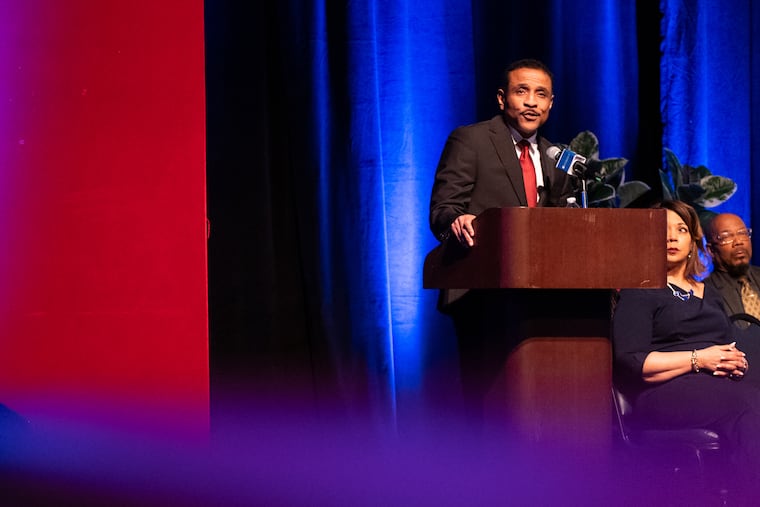Leveling, the controversial Philly schools’ process of moving teachers based on enrollment, is ending
In a surprise announcement, Superintendent Tony B. Watlington Sr. said he was ending leveling permanently, allocating $8.8 million to do so.

Leveling — the controversial Philadelphia School District practice of shifting teachers to reflect actual enrollment weeks into the school year — is ending with the 2024-25 school year, Superintendent Tony B. Watlington Sr. has announced.
Watlington made the surprise announcement Tuesday, saying the district would spend $8.8 million from central office cuts and energy savings “to fund the discontinuation of leveling in any schools or classrooms after the beginning of the school year.”
A district spokesperson said this move was permanent unless there are “significant funding reductions.”
Leveling worked this way: If one school has fewer students than projected, it might lose teachers to another school that enrolled more students than expected. For the schools that lost teachers, their students would be merged to form bigger classrooms, while the other schools would be able to divide larger classes into smaller ones with the addition of new teachers. In either case, students would have to start again with new teachers.
The $8.8 million will be used to hire more teachers to staff overenrolled schools.
Most school districts, including some urban districts that had used the practice in the past, do not engage in leveling.
“Research shows that the single most important factor in a student’s academic achievement is having access to an effective, highly qualified, and stable teacher over time. The next factor is effective, stable principals,” Watlington said in a statement. “We are committed to investing in and protecting our classrooms from budget cuts, to the extent we can.”
Long reviled by students, parents, teachers, and politicians, leveling has been used for decades in Philadelphia for financial reasons or because the district could not find enough educators to fully staff classrooms. More than 50 staffers had to move schools in October because some schools were under-enrolled based on district projections, and others had more students than expected show up.
Year after year, those affected by leveling pleaded with district leaders to discontinue it, citing the disruption to students and school communities making students start over with a new teacher. City Council held hearings on leveling over the winter.
The news that leveling was ending drew immediate plaudits.
Jerry Jordan, president of the Philadelphia Federation of Teachers, called it “a sound one and a very welcome” one.
“Over the years, we have worked to mitigate the challenges set forth by the process of leveling,” Jordan said in a statement. “To know that the district recognizes and appreciates the importance of a stable staff is significant. Every child in every school needs and deserves a highly qualified, certified teacher from the first day of school. It is imperative that we get this right for our young people.”
Anndra Wilson, a music teacher at Mayfair Elementary, was particularly thrilled at Watlington’s announcement.
In 2015, Wilson was leveled out of her first district job, at Morton Elementary. ”I remember the principal telling me, and I started crying because I had no idea what leveling was,” said Wilson. Had she known that leveling existed, she wouldn’t have left her prior district and chosen to teach in Philadelphia.
She said the end to leveling was a win for students and staff. ”With no longer having teachers taken from the classrooms in October, the relationships severed due to leveling are no more,” Wilson said. “This is an important step forward for the SDP to provide consistent relationships in the classroom for students.”
Robin Cooper, president of the district’s principals’ union, said that leveling was a “counterproductive practice” and that she found Watlington’s move “very encouraging.”
“The key positive impact is that other schools will not be losing any teachers to schools with increasing enrollments, with the end result that all schools will remain or become whole,” Cooper said.
City Councilperson Katherine Gilmore Richardson, who called for Council’s leveling hearings, said in a statement that she was “so pleased” with the news, emphasizing that studies show that students, especially Black students from low-income backgrounds, benefit from reduced class sizes.
“By reallocating approximately $8.8 million, the decision to end the practice of leveling helps to put our young people first,” Gilmore Richardson said. “I want to thank Dr. Tony Watlington and the leadership at the School District of Philadelphia for their work on this.”
Dan Urevick-Ackelsberg, parent of children in a district school and a lawyer who argued the landmark education funding case that resulted in Pennsylvania’s education funding formula being declared illegal, put it succinctly.
“The time has come,” Urevick-Ackelsberg said. “Thank God.”
Leveling isn’t OK in adequately funded districts, and it shouldn’t be in Philadelphia, either, Urevick-Ackelsberg said.
“It was a destructive practice to remove a child’s teacher after the first six weeks, all in the pursuit of efficiency because you have to save every dollar,” he said. “My hope is that this is just one indication of what it can mean when we actually invest in our schools. There is a different path that is possible, where you actually have stable teaching, and you actually have district leadership that can listen and adjust. It’s a good day.”
In prior years of leveling, district officials had pointed out that in a teaching shortage, when the district already had unfilled positions, avoiding leveling could mean adding more vacancies in the fall. But on Tuesday, the focus was on the victory of ending a much-hated practice.
The Philadelphia school board recently passed the broad outlines of a $4.5 billion 2024-25 school budget, but has not finalized details of individual school budgets. After warning of a possible $400 million deficit, officials said a $100 million increase in city funding and $247 million more from the state held off that spending gap.
But, officials stressed Tuesday, they also tightened their belt internally, reducing the central office budget with no layoffs.